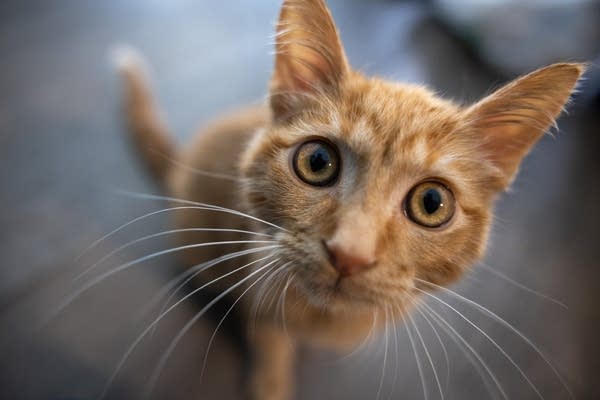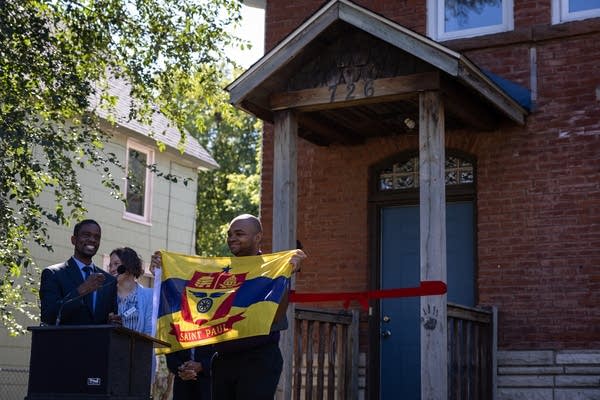First Rondo descendent buys home using St. Paul's Inheritance Fund

Go Deeper.
Create an account or log in to save stories.
Like this?
Thanks for liking this story! We have added it to a list of your favorite stories.
Anthony Bradford is the descendent of residents from the historically Black Rondo neighborhood. His great-great grandfather was one of the many residents who lost property to Interstate 94 in the 1950s.
Decades later, Bradford is now the first person to buy a home using St. Paul’s Inheritance Fund, a new program aimed at rebuilding intergenerational wealth for the descendants of Rondo residents and business owners. He closed on the home earlier this summer.
Built in the 1890s, the two-story red brick house sits on a quiet residential street seven blocks from I-94, close to Old Rondo. For decades, the neighborhood was the prosperous cultural and economic heart of St. Paul’s African American community, until bulldozers arrived in 1956 to clear a path for the freeway.
Bradford, 22, works as a software engineer in addition to several of side gigs. A $90,000 forgivable loan from the city covered 40 percent of the home’s $229,000 purchase price, putting the home within Bradford’s financial reach.
Turn Up Your Support
MPR News helps you turn down the noise and build shared understanding. Turn up your support for this public resource and keep trusted journalism accessible to all.

Establishing the fund was a key priority this year for Mayor Melvin Carter, who, like Bradford, is descended from the 700 property owners pushed out of Rondo.
“My grandparents lost over a half dozen commercial properties, and my father witnessed the St. Paul Fire Department burn down his parents’ home as a training exercise after they were displaced from their family home,” Carter said.
Many Rondo residents were paid a pittance for their homes and businesses. A 2020 study found that collectively, the former Rondo residents lost as much as $157 million in equity, adjusted for inflation, wealth they were unable to pass on to subsequent generations.
Just before cutting a ribbon on Bradford’s front porch, the mayor said the years of official apologies for Rondo’s destruction were never enough.
“We can’t undo those historical wrongs, but what we can do is to provide descendants of Old Rondo like Mr. Bradford the opportunity to reclaim that lost value,” Carter said.

The Inheritance Fund expands on St. Paul’s existing down payment assistance and homeowner rehab programs for low-income residents. The down payment program has a $2 million budget from the city’s housing trust fund.
St. Paul Housing Director Tara Beard said because of an overwhelming response, she and her staff had to temporarily stop accepting new applications after three months.
“We received over 500 applications for our down payment assistance program and over 700 applications for our homeowner assistance program. And over 25 percent of both of those numbers were folks who were Inheritance Fund applicants,” Beard said.
To qualify for the Inheritance Fund, a prospective homebuyer must have an annual income of $87,000 or less; that limit is higher for couples and families. Buyers must also prove that they’re descended from a Rondo resident displaced by I-94.
The program provides up to $100,000 in forgivable loans for Rondo descendants to purchase a home anywhere in St. Paul. There’s no requirement to buy in Rondo, but the city will kick in another $10,000 for people who purchase a home within the neighborhood’s old boundaries.

Applying for the program, which he learned about during a Martin Luther King Day symposium on building Black wealth, encouraged Bradford to learn more about his family history.
Bradford said Dan Presley, his great-great grandfather, moved to St. Paul from Oklahoma after his business in the Greenwood neighborhood of Tulsa, known as Black Wall Street, was destroyed in the 1921 Tulsa Race Massacre. Decades later the process euphemistically called “urban renewal” forced Presley to move again.
Asked what his ancestor might say about his recent home purchase, Bradford said Presley likely would have schooled him on finances.
“I know for a fact that he would want to review money with me and discipline with money, because Presleys for years have always been disciplined people. We had businesses. We knew how to take care of ourselves and our own,” Bradford said.
Mayor Carter said he’s seeking additional money for the Inheritance Fund from foundations and the philanthropic community, and hopes to reopen applications for more homeowners.



